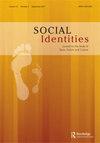Covid-19、社群主义和伊斯兰恐惧症:印度面临的疾病
IF 0.7
Q3 ETHNIC STUDIES
引用次数: 1
摘要
摘要作为对人类安全的威胁,流行病引发恐惧和焦虑,从而产生阴谋论、假新闻和歧视。2020年,对新冠肺炎疫情最普遍的仇外反应是恐华症。相比之下,印度对新冠疫情的反应既传统又特殊。与其他国家一样,印度的恐华症激增;但值得注意的是,伊斯兰恐惧症也存在。转向历史和理论,本文调查了冠状病毒如何转变为“穆斯林疾病”,并与圣战和伊斯兰化(“科罗纳圣战”)的叙事联系在一起。在印度教民族主义的信仰和政策的推动下,我们将2020年与新冠肺炎相关的仇视伊斯兰教浪潮置于一个更长的妖魔化穆斯林的过程中。鉴于穆斯林继续被降级到印度政治体的边缘,我们基于勒内·吉拉德的模仿理论,提出了将2020年疾病引发的伊斯兰恐惧症解释为替罪羊。总之,新冠肺炎在印度的案例证实,在分裂的社会中,流行病等集体威胁可能会加剧植根于社会主流记忆和规范的现有歧视形式,并强调信仰在威胁和暴力之间的中介作用。本案例研究还强调了公共话语在印度日常生活中的深刻渗透及其深远影响。本文章由计算机程序翻译,如有差异,请以英文原文为准。
Covid-19, communalism, and Islamophobia: India facing the disease
ABSTRACT
As threats to human security, epidemics cause fear and anxiety, thus generating conspiracy theories, fake news, and discrimination. In 2020, the most widespread xenophobic reaction to the Covid-19 pandemic was Sinophobia. In comparison, India’s response to the pandemic was both conventional and exceptional. Like other countries, India recorded a surge in Sinophobia; but –remarkably– in Islamophobia too. Turning to both history and theory, this paper investigates how Coronavirus got transformed into a ‘Muslim disease’ and connected to narratives of holy war and Islamization (‘Corona Jihad’). We contextualize the 2020 Covid-related Islamophobic wave within a longer process of demonization of the Muslim that is catalysed by the beliefs and policies of Hindu nationalism. In light of Muslims’ continuing relegation to the fringe of the Indian body-politic, we propose an interpretation of the 2020 disease-induced Islamophobia as scapegoating, based on René Girard’s mimetic theory. In conclusion, the case of Covid-19 in India confirms that in divided societies collective threats like epidemics are likely to exacerbate already existing forms of discrimination rooted in the society’s mainstream memory and norms, and highlights the role of beliefs in mediating between threat and violence. This case study also highlights the deep penetration of communal discourse in India’s everydayness and its far-reaching implications.
求助全文
通过发布文献求助,成功后即可免费获取论文全文。
去求助
来源期刊

Social Identities
ETHNIC STUDIES-
CiteScore
2.00
自引率
0.00%
发文量
22
期刊介绍:
Recent years have witnessed considerable worldwide changes concerning social identities such as race, nation and ethnicity, as well as the emergence of new forms of racism and nationalism as discriminatory exclusions. Social Identities aims to furnish an interdisciplinary and international focal point for theorizing issues at the interface of social identities. The journal is especially concerned to address these issues in the context of the transforming political economies and cultures of postmodern and postcolonial conditions. Social Identities is intended as a forum for contesting ideas and debates concerning the formations of, and transformations in, socially significant identities, their attendant forms of material exclusion and power.
 求助内容:
求助内容: 应助结果提醒方式:
应助结果提醒方式:


